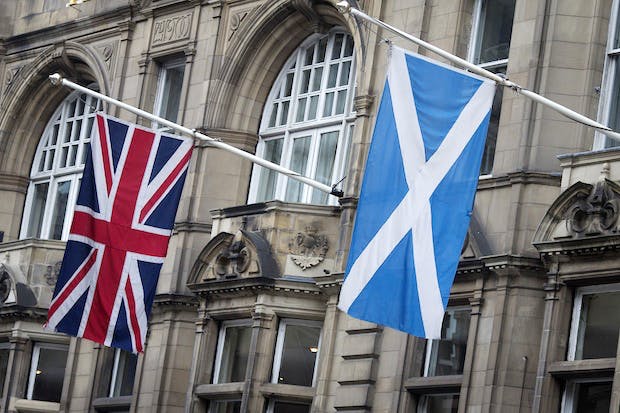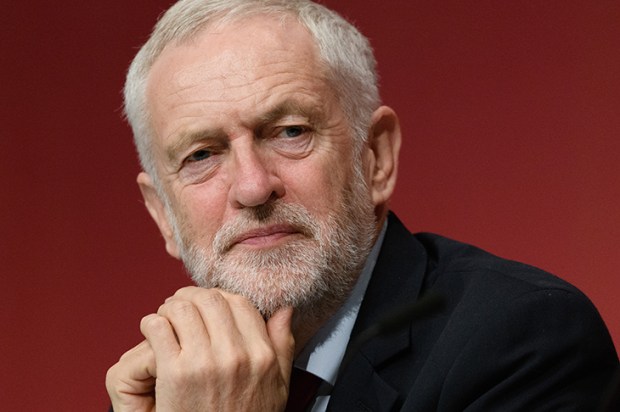Listen
http://traffic.libsyn.com/spectator/TheViewFrom22_6_February_2014_v4.mp3
From a kind of torpor about this year’s Scottish referendum, Lord Lang of Monkton has roused me.
You may remember Lord Lang as Ian Lang, a Scot who as MP for Galloway served Margaret Thatcher and John Major as a minister, under the latter both as Scottish Secretary and then President of the Board of Trade. A pleasant, steady and notably capable man, it was possible to imagine him as a potential Tory leader, but he stuck with John Major throughout.
Last Thursday, Lang secured and led a Lords debate — the first of its kind — on Scotland’s coming referendum on independence. The six-hour session presented a magnificent sweep of the principled and practical case for the Union, with many fine speeches and a maiden speech from the Baroness Goldie, who as Annabel Goldie led the Scottish Conservative party for many years. A weakness in the debate was the failure of any peer to make the unambiguous case for independence, but I would commend the Hansard report to any Spectator reader seriously interested in the argument.
I hadn’t been. In common with many English commentators I’ve perhaps lazily reflected that (1) I’m not a Scot so what do I know? (2) If they seriously want to go, so be it: this would inspire in me more melancholy than grief; and (3) all the polls suggest the result will be a clear no, so why huff and puff about something that isn’t going to happen?
Lang’s speech, thoughtful, comprehensive and sometimes moving, is a deserved rebuke to attitudes like mine, and beyond summary here; but he also pushed the argument on to new territory. Lord McConnell (following Lang) was to conclude (as did others), ‘I hope [the result of the referendum] is decisive and binding for this generation, and that we can move on,’ but it was clear from Lang’s speech that McConnell’s hopes were forlorn. Lang thought the coming referendum was unlikely to close the argument about more devolution. Further, he insisted that the coming argument, unlike the present one, will be for the whole United Kingdom, not just Scotland.
Little noticed in the ebb and flow of debate about independence has been the way that David Cameron has appeared rather casually to have conceded a new and serious reconsideration of Scotland’s powers within the Union, if or when Scotland decides to stay. Lang issued a coded and measured ‘steady on’ to that.
You can see why Mr Cameron held out the possibility. The Prime Minister’s remarks about further devolution were meant to close down discussion of a three-choice referendum in which ‘devo-max’ would be on the ballot paper. But to insist (as he did) that we could turn to devo-max only once Scotland had decided to stay, was virtually to concede that this would be the next debate. Surely it will, for the concession will not have been lost on Alex Salmond or the SNP, and a cynical view of Mr Salmond’s strategy is that he never seriously expected to win full independence, and this is all about the consolation prize.
So I wonder whether, as Lang hints, the rest of Britain, and the English news media, should already be peering forward to the other side of a no vote in September’s referendum? It may be that by this time next year all that brouhaha about full independence will seem old-hat, but a serious and awkward debate will have started on proposals for a new and virtually federal position for Scotland within a loosened Union.
If so, Labour and the Conservatives ought to be giving thought now to their responses. A wounded SNP would be trying to kick the devo-max debate into life straight away. If either Labour or the Tories don’t want that process started, they will need to try to kill the debate in sharp and final terms, ideally within hours of a Scottish decision to stay, and in the first flush of victory for the Union.
Lang is plainly apprehensive, and his speech began a rearguard action against further fiscal independence. He pointed out that, little-noticed in the new Scotland Act (2012), there are already substantial powers for a Scottish administration to levy taxes (or revoke existing taxes) to suit its budgetary policies:
‘[This is] the biggest fiscal transfer in British history, which will soon give the Scottish parliament the responsibility to raise 10p in the pound of its revenue locally with a corresponding cut in its block grant, and to raise more than that or less than that if it so chooses. Except on borrowing for capital expenditure, there is no upper limit to the use of that power.’
Lang points out that even the 3p-in-the-pound power to raise taxes that Scottish governments were given earlier was never used; and the 2012 Act greatly adds to it. Such, I suppose, will be the case against further transfers of fiscal responsibility from Westminster to Edinburgh. The case in favour will be that if the aim is to give Scotland fiscal responsibility, just give it fiscal responsibility, and stop fiddling around with 10 per cent here and a cut in the block grant there.
Let that argument commence. Meanwhile (as Lang points out) the West Lothian Question must be answered. Why should Scottish MPs help determine English questions? Lang is interested in an English Grand Committee at Westminster: an English quasi-parliament. Let that argument commence too.
But let both be arguments for the whole United Kingdom. Lord Lang reminded the House of the thought that, if an individual member proposes to leave a club, that is for the individual member; but if the proposal is to change the rules of the club, that is for all members. England, Wales and Northern Ireland would have dogs in this race.
I would argue that we would need a second, UK-wide, referendum to endorse any new settlement. The danger would be this: that Scotland might vote against Scottish fiscal independence, and England might vote in favour. With characteristic restraint, Lord Lang did not venture upon such speculation.
Got something to add? Join the discussion and comment below.
Get 10 issues for just $10
Subscribe to The Spectator Australia today for the next 10 magazine issues, plus full online access, for just $10.















Comments
Don't miss out
Join the conversation with other Spectator Australia readers. Subscribe to leave a comment.
SUBSCRIBEAlready a subscriber? Log in